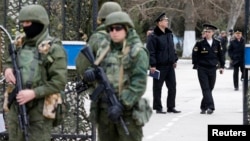Each day, VOA will curate a selection of these editorial opinions, highlight selections, and offer them for our readers’ consideration.
The opinions expressed below are, of course, those of the authors, not the Voice of America.
"The Price of Failed Leadership" Commentary by Willard "Mitt" Romney, former Massachusetts Governnor and Republican Presidential nominee 2012, published in the Wall Street Journal.
"Some simply cannot envision the future and are thus unpleasantly surprised when it arrives. Some simply hope for the best. Others succumb to analysis paralysis, weighing trends and forecasts and choices beyond the time of opportunity.
"Their failure has been painfully evident: It is hard to name even a single country that has more respect and admiration for America today than when President Obama took office, and now Russia is in Ukraine.
'Part of their failure, I submit, is due to their failure to act when action was possible, and needed.
"Putin's Global Ambitions Could Destabilize Europe" Op-ed by Molly McKey and Gregory Miatis, former advisors on security and other matters to then Georgian President Mikheil Saakashvili, published in the Washington Post.
"In each of these cases — as in Russia — local political challenges were followed by a rise in anti-European rhetoric that became muddled with ideas of Orthodox values.
"Now Putin has made himself a champion of this narrative of discontent and that of a glorified Orthodox past.
"The message is that the “moral community” of orthodoxy is strong and that it doesn’t come with the hard membership criteria many Orthodox nations have struggled to meet.
"The closed, comfortable worldview — It’s okay to be what you are — was founded on geographic isolationism but is now driven by a rejection of the Europeanist ideology that is its greatest competitor.
"A meeting of the Orthodox Church’s Ecumenical Council in 2016, the first such meeting in 1,200 years, could be a key moment in these developments.
"Less than two years ago, Russians bravely gathered to call for a Russia without Putin. Putin has succeeded in changing the narrative to a resurgent, single-minded Russia vs. a West irrevocably in decline.
"Putin believes that ideologies inextricably linked to morality are in head-to-head competition, and he has proven adept at engineering scenarios to force a choice."
"Europe Should Impose Stiffer Penalties" Commentary by David Böcking, German journalist and political columnist, published in Der Spiegel.
"It is a question of credibility. Not doing so is tantamount to Germany and the EU saying: 'You know what Mr. Putin? The Crimea isn't actually that important to us after alll.
"Led by German President Joachim Gauck, Berlin only recently demanded that the country take on more responsibility in the world. Chancellor Angela Merkel made clear early on that military intervention in the Crimea crisis isn't an option. That makes sense.
"But what other alternatives could Europe pursue?
"The economic lever is all that's left. Russia is highly dependent on imports from the EU, particularly from Germany.
"But even more painful than a reduction of European exports to Russia would be a moratorium on EU natural gas and oil imports from Russia, or at least a credible threat from Brussels that it was prepared to do so.
"Russia and Putin's military machine, after all, are reliant on income generated by energy exports.
"It would not be an easy step to take.
"But the difference could be compensated for via oil and natural gas deliveries from other sources. It is, of course, undeniable that such a step would drive up energy prices in Germany and the rest of the European Union.
"Economic growth, already weak, would suffer. But if we Germans are serious about taking on more foreign policy responsibility, then we also have to be prepared to pay the requisite price."
"Las Profundas Razones Geopoliticas de Rusia" - "The Deep Political Reasons of Russia" Commentary by John Mearsheimer, political science professor, University of Chicago writing in Clarin the daily Spanish language newspaper in Buenos Aires.
"But the Russian leader is obviously not talking with lawyers; he sees this conflict in geopolitical, not legal terms.
"Mr. Putin’s view is understandable.
"Because there is no world government to protect states from one another, major powers are acutely sensitive to threats — especially near their borders — and they sometimes act ruthlessly to address potential dangers. International law and human rights concerns take a back seat when vital security issues are at stake.
"Mr. Obama would be advised to stop talking to lawyers and start thinking like a strategist. If he did, he would realize that punishing the Russians while trying to pull Ukraine into the West’s camp will only make matters worse.
